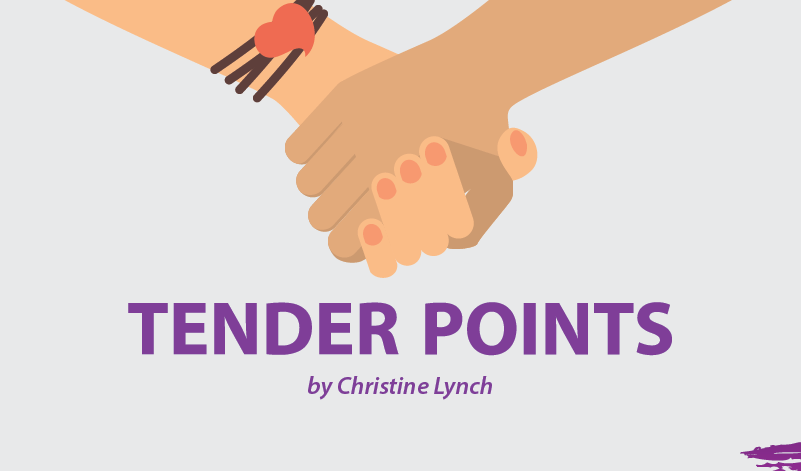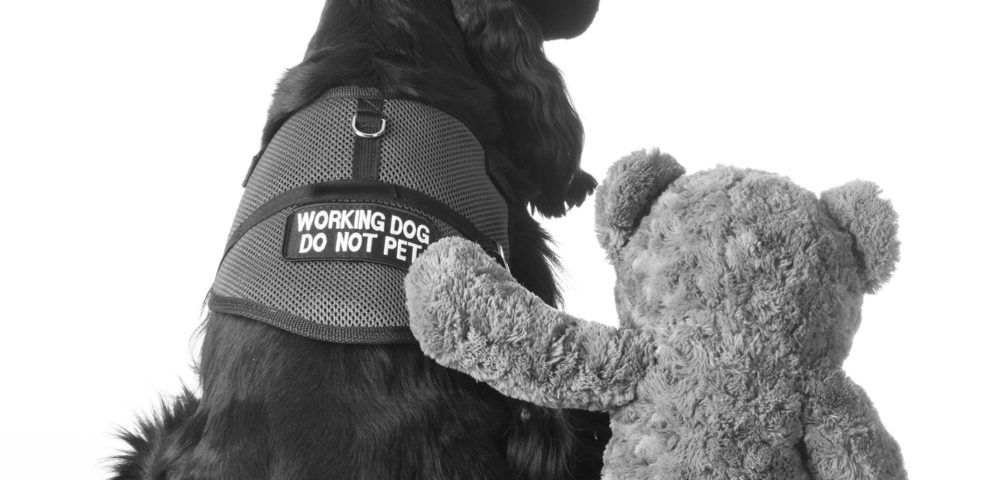
According to several studies, interaction with dogs significantly reduces pain and emotional distress in chronic pain patients. At first glance, it would appear that dog ownership would be helpful for fibromyalgia sufferers. However, this study was done with therapy dogs, calm by nature and very well-trained. Few people have dogs like these. Untrained, misbehaved dogs are a whole lot more common. Dogs like these can have the opposite effect — especially on fibromyalgia sufferers whose bodies react negatively to sensory disturbances.
I had the perfect fibro dog, although I didn’t know it at the time. Charlie was an 11-pound Llhasapoo that never shed a hair. He was the perfect size for me — small enough to lift, big enough to hug. Holding him was my favorite thing to do. Stroking his silky fur calmed my anxiety and relieved my pain.
Because Charlie was my first dog I was concerned about housebreaking. I’d read all the books so I felt prepared, but it was a new experience for me. The day he arrived I watched his every move. At the first sign of a squat, I scooped him up and quickly out the door. He was rewarded with a treat when he was finished. After that, he used his dog door every time.
I also was concerned about barking. Loud noises of any kind are stressful to me — annoying at first and painful if continued. I worried needlessly. Other than his daily “Woof” to protect me from the mail lady, this dog was silent.
Although Charlie was much cuter than he was smart, he was anxious to please and to earn a reward. Teaching him commands was fun for both of us. Within a year Charlie and I had passed the therapy dog training test. Dog ownership became much simpler for me then. Wearing his little blue vest, he could go anywhere I went, even to the grocery store.
Charlie’s favorite thing was walking. Because of him, I walked every day. It was the motivation I needed for stretching my stiff, sore body. His friendliness generated friendships with neighbors I otherwise never would have met — a huge advantage for isolated fibro people.
Unfortunately, Charlie didn’t have perfect health. In the 10 years I had with him, he required several surgeries to remove bladder stones. Specially formulated dog food was supposed to prevent further occurrences, but didn’t. Ultimately, he developed colon cancer and departed this world nearly three years ago.
I still mourn his loss. It’s taken a long time to open my heart to another dog. But I’m finally ready, and I’m on the hunt. Knowing what I know about my sensitive body, added to what I now know about dogs, I’m being very selective and alert for negative traits that are, or may become, stressful for me. I also know from experience that perfect fibro dogs do exist. For me, it’s worth the extra time and effort to find one.
***
Note: Fibromyalgia News Today is strictly a news and information website about the disease. It does not provide medical advice, diagnosis, or treatment. This content is not intended to be a substitute for professional medical advice, diagnosis, or treatment. Always seek the advice of your physician or other qualified health provider with any questions you may have regarding a medical condition. Never disregard professional medical advice or delay in seeking it because of something you have read on this website. The opinions expressed in this column are not those of Fibromyalgia News Today or its parent company, BioNews Services, and are intended to spark discussion about issues pertaining to fibromyalgia.


This message was so much of a great news to me because I too suffer and find comfort with my puppy..but how do you get your pet certification for me..
Murray260hotmail is my email..
Rhonda
Rhonda: My goal was to take Charlie to visit hospitals and nursing homes. I contacted an organization called Pet Partners. They sent me all the information I needed to train him to pass their certification test. It took about 6 month of daily training for him to be prepared.
I need to know I suffer as well
But, how do you find that “fibro” dog. Are you looking in shelters, breeders? My husband had a wild and crazy hunting lab. I love Rudy but he definitely exacerbated my fibro. I am now without a dog and recently lost my husband. Have been thinking about a small dog, but where do I start?
I would look online at websites such as rescueme.org. They list available dogs. Foster owners can usually judge whether a dog is the right temperament for you.
A good way would be to research reputable rescues in your area that place dogs in foster homes and can describe their behaviors. Dogs, like humans need time to adjust and it can take several months to a year for an average dog to acclimate. You can also talk to vets in your area who usually have a few dogs a year that clients need to rehome (divorce, moving, illness etc) that they typically know the history and life of the dog and its behaviors. You can ally with a trainer and ask them to help you screen potential service dog, emotional support, or therapy dog candidates (many trainers respond best to the idea of therapy dogs as they can become hostile about disabled or mentally ill people owning pets sometimes), but expect you will need to pay these people for their time and expertise. Finally you can look for reputable breeders, but you will need an idea of what breed you want first. I recomend a few months to a year of research first.
If walking a dog every day once or twice is outside the realm of possibility for you (or won’t have help for that)- you are most likely going to want a cat instead.
I started my hunt in Jan. 2009. My final decision was to get a female Maltese. I knew I needed her to weigh no more than 10 lb. I found her in May 2009 & she came home with me The day after Mother’s Day, my present to me. She wasn’t quite 7mo old. Her name is Lizzie, short for Elizabeth of Joy. She has been n such a joy for me while coping with this horrible disease. She is my Therapy Dog & I can take her everywhere I go, even on airplanes. All I need is a note from one of my doctors with a renewal every year.
How did she become your therapy dog? Was it an online application process or did you and she go through a training program? I’m in the process of adopting another dog, and I don’t have the patience I used to have when I trained my previous dog. If there’s an easier way, I’d like to know about it. Thank you so much. I’m so glad you found the right dog for you.
I would love to have a small hypoallergenic therapy dog, I have Fibromyalgia and Degenerative Disc disease of the neck and back also chronic migraines. A hypoallergenic therapy dog would help me with my pain and severe anxiety. My e mail is [email protected]
I’m not aware of an easy way to obtain a therapy dog. Finding an appropriate dog and training it yourself is the only way I know. Then getting you and your dog certified can be done through Pet Partners. A service dog is different. Those dogs are trained by volunteers to perform particular tasks people cannot do for themselves. To learn if you qualify for one of those, contact Canine Companions.
Service dogs can actually be owner trained as well, and it particularly common with psychiatric service dogs (psychiatric service dog partners is a good org with info on this)
This is as beautiful story. Thank you for sharing it.
I suffer from chronic pain every day with pain I have back problem plus fibro it is harble can Simone contact me about how I can have a services dog I have a dog she is a German S can she be trained
I know breeders of dogs were not mentioned here. A good breeder will do health and genetic testing which can avoid many problems you may find with rescues such as health issues or behavioral issues if they were abused or poorly bred. I have fibromyalgia degenerative disc disease, scoliosis and in remission of metastatic breast cancer and am a retired RN. I own and occasionally breed,Chinese Cresteds. They are wonderful! They come in two varieties, hairless and powderpuff. They are about 11-13″ tall and weigh 10-15lbs. Fun little guys with wonderful personalities that are great lap dogs. They love their owners and are quite smart. every fibromyalgia sufferer should have a dog.
I can strongly recommend a Japanese Chin, I have had 2 female Chins (otherwise known as a Japanese Spaniel) and they are incredibly smart, very emotionally attached to their owners, they’re small and require very little exercise (due to this Chins are often called apartment-dogs), but are playful, love to snuggle, and are not yappy in any way. Of course, like all dogs, with poor training Chins can be turned into yappy, agitated animals. But by nature the Chin is quiet, and a very good dog! I rescued a middle-aged Chin who loved me and was a fantastic fibro dog until she passed away. My ex-husband bought me a purebred Chin puppy in 2016 and I fell head over heels for her, a tiny puppy that was smaller than a soda can and she has been with me ever since. I don’t know what I will do when her time comes.
Hope this provides good info or advice to anyone looking for a new fibro pup.
Wishing you gentle, pain free and fun days ahead when you and your new dog finally meet and develop a lasting friendship. All the best to both of you…..
I have 3 cats and justbought a Jack Chi he’s small and gorgeous. No trouble at all as I’m training him. I work from home so he keeps me company. Pets are amazing for chronic health. But I’d advise buying a Hepa filter for you your living room to help with allergies and odours.
Please research Therapy Dogs vs ESA vs Service Dogs before taking your dog to non-pet friendly places. And, the online sites that say they can register your dog as a ESA and certify it, are a scam.
I have fibro. Charlie, my ‘foster failure’, knew my every mood and was always right there for me for 15 years. Then Smokey came into my life, just when I needed him the most. Sometimes you don’t find them, they find you. I would truly have been lost without either of them.
May I ask everyone’s opinion on a Jack Russell for chronic pain sufferers?
In my experience Jack Russells are quite high energy. On the other hand, they are extremely smart and easy to train. If you have a way to keep this dog well exercised, it could be a great choice. Otherwise, his excess energy may lead to negative behaviors. That said, every dog (like every human) has its own personality. I wouldn’t rule it out.